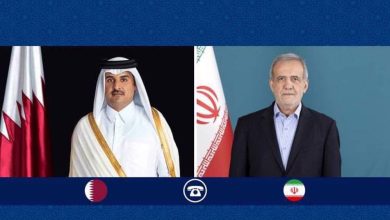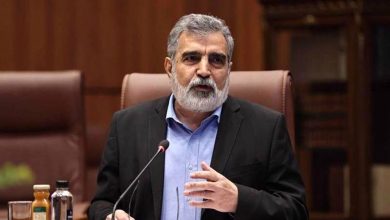Zionist regime’s intelligence agency:”Significant” Iranian infiltration to Mossad becomes major challenge
The chief of Israel's internal intelligence agency has attributed the country's significant challenges, including mismanagement issues and what he characterized as Iran's extensive penetration into Israeli intelligence, to the actions of the Israeli prime minister.

On Thursday, Shin Bet Chief Ronen Bar conveyed a message highlighting the particularly challenging and multifaceted phase currently being experienced by Israel.
He noted that Iran’s influence is significantly entrenched in Israel, pointing to one of the major challenges currently confronting Tel Aviv.
The unrest described by Bar as affecting the regime arises amidst reports of a growing number of espionage incidents within the occupied Palestinian territories.
In January, Shin Bet reported a significant surge in espionage activities linked to Iran, with the intelligence agency noting a “400-percent increase” in identified cases for 2024 compared to the previous year.
The agency announced it has formally charged 27 individuals accused of illegal settlement as it continues to pursue these cases. Additionally, it reported the dismantling of 13 significant espionage operations purportedly aimed at the regime.
In October of the previous year, local authorities, alongside the regime’s police force, announced the apprehension of two individuals described as settlers, situated to the east of Israel’s commercial center, Tel Aviv. These individuals were reportedly detained on allegations of conducting espionage activities on behalf of Iran.
In light of the Shin Bet’s January findings concerning espionage activities, it has come to attention that two Israeli army reservists, identified as Yuri Eliasfov and Georgi Andreyev, have been detained on allegations of espionage for Iran. The accusations entail the purported disclosure of sensitive information regarding Israel’s Iron Dome missile defense system.
Continuing to chronicle the array of challenges facing Tel Aviv, Bar highlighted that up to 59 Israeli individuals, captured by Palestinian militants in the occupied territories during October 2023 and subsequently taken to the Gaza Strip, remain within Palestinian custody.
A spokesperson from the Gaza-based resistance group Hamas indicated that the organization “has not yet been defeated,” despite ongoing statements from the opposing regime regarding its objective to “destroy” the group as part of an ongoing military campaign targeting the Palestinian territory.
The intelligence chief stated that the region is embroiled in a complex and extensive conflict, highlighting the regime’s intensified military actions against the occupied West Bank, Lebanon, Syria, and Gaza.
Bar has criticized Netanyahu for obstructing probes into the administration’s intelligence lapses. These shortcomings were exploited by Palestinian resistance groups on October 7, 2023, when they conducted a significant operation targeting the occupied territories. During this event, they managed to take hostages by penetrating deep into these areas and surrounding key Israeli military installations.
Analysts have interpreted the Israeli Prime Minister’s comments as an attempt to conceal the significant failures of his extended time in office, in a bid to safeguard his position of power.
In a recent development, the head of Israel’s intelligence agency issued a letter in reaction to Prime Minister Benjamin Netanyahu’s efforts to remove him from his position. This maneuver has faced substantial criticism from numerous officials within the Israeli government, who have labeled it as being driven by political considerations.
Bar argued that his dismissal was aimed at hindering a thorough investigation into the events of October 7, an inquiry that could potentially threaten Netanyahu’s political future.
He cautioned that actions like his removal jeopardized Shin Bet’s capacity to function “impartially” and to thoroughly investigate the underlying causes of security breaches.
The head of the Shin Bet has alleged that intervention by Prime Minister Netanyahu has disrupted efforts to negotiate the release of the remaining Israeli captives.
In a recent statement, an official claimed that his ousting has adversely affected ongoing negotiations and has not facilitated the release of hostages. He alleged that the real objective behind his removal was to carry out discussions without genuinely intending to reach an agreement to secure their freedom.
An official alleged that the prime minister’s obstructive conduct was motivated by personal interests rather than considerations for the regime’s security.
Israeli Attorney General Gali Baharav-Miara has called on Prime Minister Benjamin Netanyahu to elucidate the legal grounds for the removal of Bar, highlighting the importance of placing the interests of the state and its settlers within disputed territories above any individual considerations.
Numerous Israeli opposition figures and organizations have denounced the action, characterizing it as an attack on the country’s legal framework. This development highlights deeper tensions within the governing institutions in Tel Aviv.
Bar characterized the efforts to oust him as a “sham procedure with a predetermined outcome,” criticizing the campaign as reliant on “baseless allegations” that he argued merely serve to mask “dubious and illegitimate motives.”
The initiative seeks to obstruct the Shin Bet’s capacity to execute its responsibilities in an unbiased manner, in accordance with legal standards, rather than catering to personal agendas. Additionally, it aims to block the uncovering of facts related to both the circumstances preceding October 7 and the significant cases presently under Shin Bet’s scrutiny.
The message was delivered during a period when the confidence of the regime’s settlers in Tel Aviv’s ability to uphold their interests has significantly diminished.
Protests have broken out as demonstrators criticize Prime Minister Benjamin Netanyahu for employing military actions in Gaza as a means to distract from his domestic political struggles, notably the persistent corruption charges against him.
Critics within Israel contend that the Prime Minister is exploiting external threats as a means to quell opposition and consolidate his hold on power, amid growing calls for his resignation, with more than 60 percent of settlers urging his departure from the political scene.
A recent survey has revealed that public confidence in the Israeli military has fallen to a historic low, with 47 percent of respondents expressing distrust in the institution.







